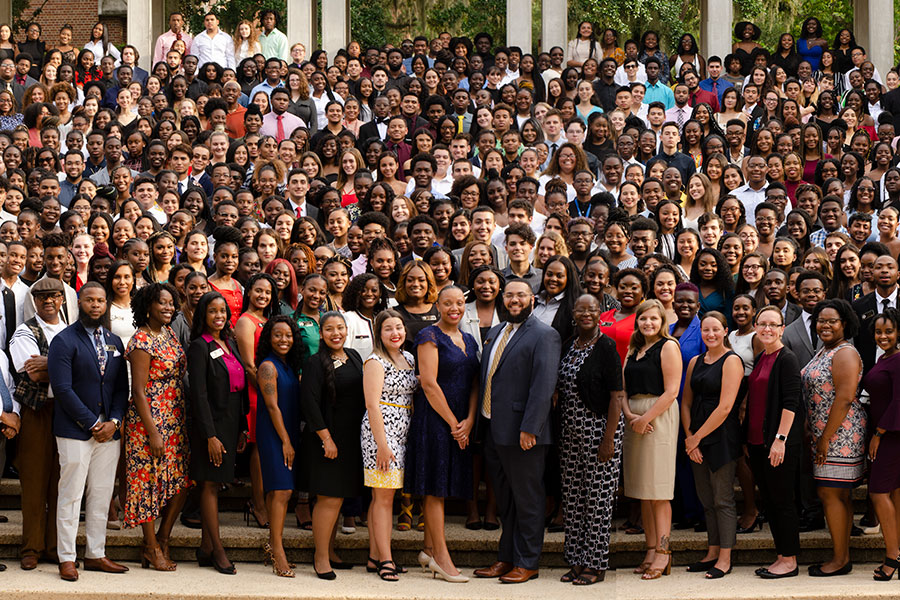
Beginning college can be an overwhelming experience for first-year students. And starting college amid a pandemic can make the experience more intimidating. For first-generation students, it can be an even bigger challenge.
To help ease the transition to college for first-generation students, Florida State University’s Center for Academic Retention and Enhancement (CARE) provides a foundation of support along with opportunities for campus engagement through its annual Summer Bridge Program (SBP). This year’s cohort will be the first in the program’s history to complete it virtually — and for class credit.
“Each year, we welcome more than 400 students to FSU to engage in academic success programming and workshops and develop a community of scholars who all are the first in their family to go to college,” said Tadarrayl Starke, director of CARE.
Traditionally, students admitted to CARE begin their studies during the summer term and live together on campus while participating in the SBP. When FSU announced that classes would be delivered remotely during Summer Session C, it became evident that the program needed to be reimagined into a remote format.
CARE collaborated with the College of Education to create the “First-generation Student Success Course.”
“Essentially we’re running our SBP through a course-based format where every week is a different topic that we know our students, as first-generation students, will benefit from,” Starke said.
“We’re covering as many bases as we can to help them feel connected and engaged with each other and the university,” said Lisa Jackson, associate director of CARE. “We think it’s essential for them to really feel like they’ve arrived at FSU, and considering that we suddenly had to make this virtual, it’s going pretty well.”
While course content is important, student engagement is a key component of the SBP.
“We’re still keeping a lot of the basis of what has made the SBP successful and just trying to find a way to tweak it to be more online,” Starke said. “There’s still going to be that section of the SBP that is non-class based, focusing on students just building relationships with each other, their ambassadors and the FSU community.”
During the SBP, CARE students are connected to CARE ambassadors to assist them with transitioning to the university. This year, CARE ambassadors will serve as course facilitators for the SBP course.
Rose Antoine served as a CARE ambassador last year and will serve again during this virtual term. Antoine, who completed the SBP in 2016, knows that CARE ambassadors are an integral part of the program.
“The role of a CARE ambassador is to be a mentor and provide any type of support that our students need,” Antoine said. “It’s about trying to help them, support them and prepare them for what’s coming up. Being a first-generation student is already hard enough, and we know that the CARE ambassadors play a key role in creating relationships with students to help with their retention. Our role is to make sure that they feel supported and connected to the campus.”
Ariel Trueba, who completed the SBP in 2018, has returned this year to serve as a CARE ambassador. He’s excited to help the latest cohort acclimate to the college environment, but he’s also aware of the challenges that a virtual SBP presents.
“Being first-generation can sometimes mean that your family life isn’t the best, and it’s definitely different when students are home and still exposed to those situations,” Trueba said.
CARE knew that their students, as first-generation students, would have special needs to assess, like housing insecurity. CARE reached out to these students individually to quantify the situation and figure out how many students would need to live on-campus.
“We worked closely with University Housing and University Health Services to arrange for COVID-19 testing so that we could get those students out of difficult situations and here safe to focus on their academics,” Jackson said.
CARE conducted a second survey to find out which students needed laptops and cameras to complete their coursework and program requirements virtually. Then, the program worked closely with ITS to get laptops refurbished, set up and shipped out to students in time to do their work.
Starke said that aside from addressing concerns of housing insecurity and technology shortages, the most challenging part of going virtual has been scheduling speakers and guest lecturers.
An unexpected silver lining, however, is that plenty of CARE alumni have asked how they can help. This prompted the program with the opportunity to build a panel of CARE alumni to talk to students about what they can expect through college and post-graduation.
“We’re doing everything in our power to make sure that this summer is memorable not just because of the pandemic, but because they’re going to form relationships and build skills and take advantage of the opportunities that we’re going to put in front of them,” Starke said.
The virtual SBP may not compare to the late nights in the residence halls and organic conversations that happen when students are physically together, but the students choosing to enroll in and complete the program during this uncertain and unprecedented time is proof of this cohort’s vitality.
“They’re making history for our SBP, and it’s yet another testament to their resilience and determination to pursue a degree in higher education, because they’ve committed to engaging and moving forward,” Jackson said.
This year’s CARE cohort boasts an average GPA of 3.83 and an average ACT score of 22 and SAT score of 1118.
To learn more about CARE and the SBP, visit care.fsu.edu.




